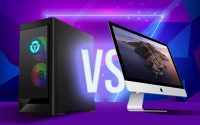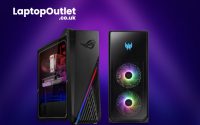How to Choose the Best Components for Your Gaming PC
Building a gaming PC can be an expensive and daunting task, and it is essential to make sure that you purchase the right components to ensure peak performance. Choosing the best components for your gaming PC involves more than just picking the most expensive parts. It is important to consider all the components of your PC and understand how they work together to give you the best gaming experience.
In this article, we will discuss the key components of a gaming PC, the benefits of each component, and some tips for choosing the best components for your gaming PC. The information presented in the article will help you to make an informed and cost-effective decision while building your gaming computer.
Considerable Factors While Forming Your Gaming PC Setup
To get the best gaming performance without compromising your budget, following are some of the critical factors that you need to pay heed to while building your next gaming station:
Consider Your Budget and Needs
When building a gaming PC, it is important to consider both your budget and your needs. Budget is often the most principal factor – you want to make sure that you have a suitable amount of money to spend on the best PC components, delivering the best performance for the price. If you are a bit tight on budget, we would suggest you buy only those computer components that you really need. Because in the case of best gaming desktop PCs, you do not need a machine which is a jack of all trades and master of none.
Another important consideration when setting up your gaming computer is to understand your gaming needs. If you are a casual gamer or love to play medium-intensity games, you do not need to spend a heavy budget on purchasing a top-notch processor. Similarly, if you are a pro gamer, a mid-range CPU can’t seamlessly run your heavy-duty games. In short, strategising your budget as per your gaming needs is the best option to go for getting the best return on your investment.
Invest in Quality RAM
RAM (random access memory) is a crucial component for any gaming PC. It allows your PC to access data quickly, allowing for quicker loading times and smoother in-game performance. When choosing RAM for your gaming PC, it is important to consider the type, capacity, and speed of the RAM.
The two main types of RAMs, DDR3 and DDR4. DDR3 is older and is available in capacities up to 16GB. DDR4 is newer and offers higher capacities and better performance. It is important to note that DDR4 is not backwards compatible with DDR3, so be sure to select the correct type of RAM when building your gaming PC.
When it comes to RAM, more is almost always better. Higher capacity RAM allows for faster loading times and smoother in-game performance. For gaming PCs, the most common capacities are 8GB and 16GB, but larger capacities such as 32GB are available.
RAM speed is measured in MHz, and it is important to select the right speed for your gaming needs. Higher speeds allow for improved performance, but higher speeds also require more power to operate. When selecting RAM, choose speeds of either 2400MHz or higher. Investing in quality RAM will allow you to enjoy improved performance and faster loading times.
Choose the Right Processor
Opting for a computer processor as per your gaming preferences holds a crucial value in the overall processor of setting up a gaming PC. You can focus on these points to eventually make the right choice in terms of CPU.
1. Understand the Benefits of Different Processors: Learn about the differences between processor architectures, performance levels, and other features to find the best fit for your gaming needs.
2. Consider Your Budget: Choose a processor that fits within your budget without sacrificing too much performance.
3. Research Reviews and Ratings: Read reviews and ratings from experts to determine which processors are the best for gaming.
4. Check for Compatibility: Be sure to check if your chosen processor is compatible with your motherboard, RAM, and other components.
5. Monitor Temperature and Cooling: Temperatures can limit the performance of your processor, so make sure to check temperatures and invest in the best cooling solution.
6. Upgrade Your Drivers: Make sure to update your drivers regularly to get the best performance from your processor.
7. Consider Upgrade Options: Look at processor upgrade options to ensure your gaming experience remains up to date for years to come.
Determine Your Graphics Card Needs
Always assess your graphics demands before finalising a GPU for your gaming computer. Ponder over following points:
• Determine what type of games you plan to play. Different types of games require different levels of graphics card performance.
• Explore the resolution of your monitor. Make sure to choose a graphics card that supports your monitor’s resolution.
• Decide how much graphical horsepower you need. Consider things like frame rate, special effects, and gaming performance.
• Check the compatibility of your PC setup. Make sure any graphics card fits in your computer’s case, uses the appropriate power connectors, and does not exceed your motherboard’s limitations.
• Find out if your current graphics card is upgradeable. Many graphics cards from a few years ago may not have upgradeable parts available.
• Research the available graphics cards. Research graphics card models, prices, and performance to find the best graphics card for your needs.
• Consider getting a graphics card with extra features. Graphics cards with extra features like SLI and CrossFire may give you extra performance.
• Consider buying a graphics card that comes pre-overclocked. Overclocked graphics cards deliver better performance than stock graphics cards.
• Make sure to buy a reliable graphics card. Buy your graphics card from a reputable manufacturer that offers warranties and customer support.
The Bottom Line
Building a gaming PC is an exciting and rewarding experience if you take the time to do research and select the best components for your needs. Make sure to pay attention to the core components of the system – CPU, GPU, RAM, storage, and cooler, as well as any extra peripherals depending on your gaming preferences. Moreover, do not forget to factor in budget, size, and maintenance requirements when shopping for components to enjoy a customised gaming experience.



Awsome info and straight to the point. I am not sure if this
is truly the best place to ask but do you guys have any thoughts on where to employ some professional writers?
Thanks 🙂 Escape room
I believe that is one of the so much significant information for me.
And i’m happy studying your article. However wanna remark on some basic things, The website style is perfect, the articles is in point of fact excellent : D.
Good process, cheers